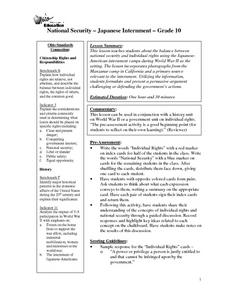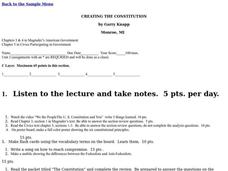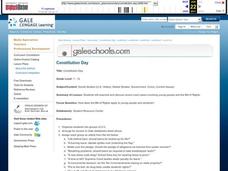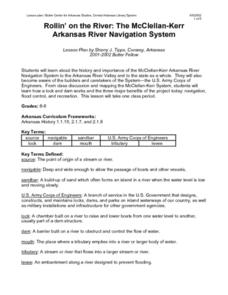Curated OER
National Security - Japanese Internment
Tenth graders investigate the balance between national security and individual rights using the Japanese American internment camps during World War II as the setting. The instructional activity incorporates photographs from the Manzanar...
Curated OER
Religious Intolerance in Afchanistan
Young scholars, as a group, examine and discuss the destruction and planned demolition of Buddhist artifacts in Afghanistan by the Islamic Taliban government. They further research the issue and then hold a simulated summit with...
Curated OER
Internment of Japanese Americans
Students study the Japanese-American experience in the western United States during World War II. They view a video, "Japanese Relocation" and take notes on arguments in favor of internment. They share their notes and new vocabulary...
Curated OER
CREATING THE CONSTITUTION
Students engage in a variety of activities aimed at strengthening comprehension of the Constitution. The activities are part of a layered curriculum and students create a portfolio for assessment.
Curated OER
Same Sex Marriage Legislation
Learners explore the Vermont legislation that allowed for same sex marriages. The implications for civil rights are investigated to encourage students to state opinions.
Curated OER
Constitution Day
Students examine and discuss recent court cases involving young people and the Bill of Rights.They use a focus question to create the context for class discussion: How does the Bill of Rights apply to young people and students?
Curated OER
Lincoln-Douglas Debates of 1858
Young scholars examine the transcripts of the 1858 Lincoln-Douglas debates and create a platform for each candidate in the 1858 Senate race. They utilize the candidates' arguments to explore the historical and political impact.
PBS
What Are the Primaries and Caucuses?
What are the essential differences between primaries and caucuses? As part of a study of the process by which Americans select their candidates for US president, class members examine the nominating process, the changes that have...
Curated OER
Rollin' on the River: The McClellan-Kerr Arkansas River Navigation System
Middle schoolers take a close look at the McClellan-Kerr Arkansas River Navigation system. They study how the Army Corps of Engineers built and monitor the system. Learners discover how a lock and a dam work, and study three benefits of...
Curated OER
Perceptions of War
Tenth graders share perspectives on war with Iraq with students from various countries, and write position papers expressing specific stance on issues.
Curated OER
Do You Know the Story of Pomp?
Students examine and read about Pomp, the infant son of Sacagawea. They research the Lewis and Clark expedition, create a storyboard presenting important events, and design a Powerpoint presentation.
Curated OER
Little House in the Census: Almanzo and Laura Ingalls Wilder
How would you use census data from 1880-1900? Here are a set of ways you can incorporate the book Little House on the Prairie and US census data from that time period. Learners will research the validity or the book based on factual...
Tennessee State Museum
An Emancipation Proclamation Map Lesson
Did the Emancipation Proclamation free all slaves during the Civil War? Why was it written, and what were its immediate and long-term effects? After reading primary source materials, constructing political maps representing information...
Curated OER
The Bill of Rights in Current Events
Divided the class into pairs, each group is assigned one of the amendments. They use the internet to research current cases and issues involving their amendment. They are then lead into the introduction to some of the basic concepts of...
Curated OER
Defining Moments From the Past: Japanese American Internment
Learners conduct a mock Congressional Hearing to decide whether or not Japanese Americans who were sent to internment camps during World War II should be provided financial restitution. They research and create a time line of events...
Curated OER
Differences and Settlement in the Legislative Budget Process
Students discuss the issues at hand when legislators are trying to agree on policy. In groups, they role-play different roles within a sub-committee when trying to balance the budget. They present their findings to the class and...
Curated OER
Due Process of Law and the Jim Crow Era
Students analyze eight case studies of Supreme Court decisions regarding due process of law and their impact on American society in the early 20th century. They digest that although the 14th amendment was intended to give federal rights...
Curated OER
Kill the Indian, Save the Man!
Students investigate primary sources from Carlisle Indian School including letters and photographs. In this investigative lesson students answer questions about their research.
Curated OER
The Treaty Trail: Examining an Artist's Perspective
Elementary school leanrners examine artwork from the time period of the United States and Native American treaties. They discuss the causes and effects of the treaties being signed. They also examine how cultural perspective influences art.
Curated OER
What Does It Mean To Be a Good Citizen?
Students study citizenship and what it means to be a good sitizen. They create their own country and determine its citizenship rules. They work together to create a visual representation of what makes a good citizen.
Constitutional Rights Foundation
If Men Were Angels: Teaching the Constitution With the Federalist Papers
Much like the methods of group work, the writers of the Federalist Papers worked together to advocate for their viewpoints against the anti-federalists. The resource enables learners to break into small groups and conduct research before...
Curated OER
Consequences of the Sedition Act
Students research and discuss the consequences of the Sedition Act. They illustrate the difficulty of balancing security needs and personal freedom using an example from John Adams's presidency.
PBS
Making Change: Revolutionary Tactics of the Civil Rights Movement
The film American Revolutionary: The Evolution of Grace Lee Boggs introduces viewers to the differing philosophies of and strategies employed by 1960s civil rights leaders such as Malcolm X and Martin Luther King, Jr. and the debate over...
Global Oneness Project
Repairing the Fabric of Democracy
During elections, headlines constantly lament the issue of low voter turnout. Help class members understand why this is such an important topic with relevant articles, a discussion of both sides of the issue, and a reflective essay.

























